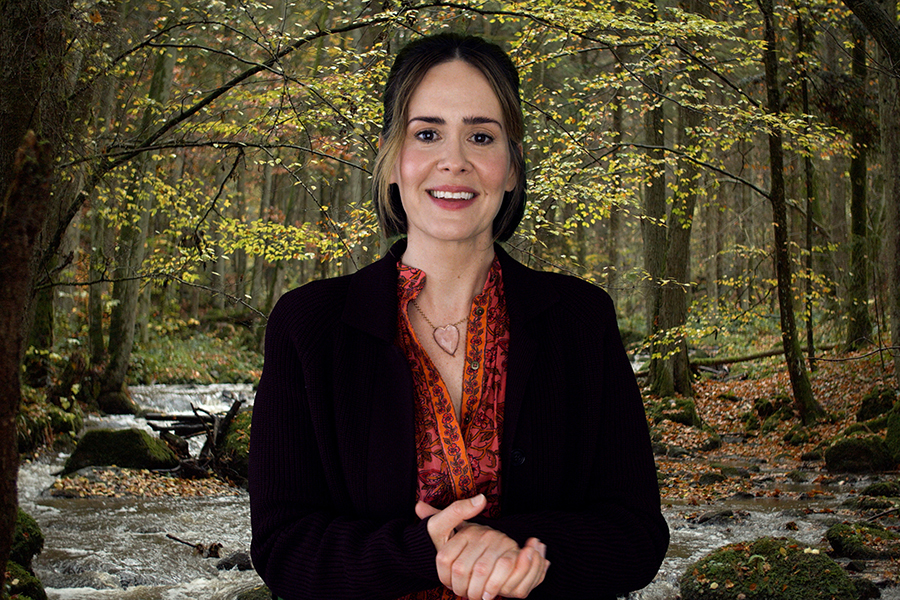Coastal elites, please stop criticizing ‘Coastal Elites’
In “Coastal Elites,” which is available for streaming through HBO, Sarah Paulson plays a meditation guru who guides her Zoom audience in some much needed breathing exercises after her mom tells her that this whole “corona thing” will just blow over.
Penned the worst film of the year by The Guardian, “Coastal Elites” is playwright Paul Rudnick’s newest project. Originally produced for Broadway, the play moved to the digital format due to the pandemic. The movie consists of five separate monologues, each delivered by a character with a personal story to tell about the current political climate.
The Guardian hated the movie and found the characters tone deaf. I, on the other hand, thought the movie was thought-provoking and found the characters hilarious. So what’s the difference between the way I saw the movie compared to the way The Guardian saw it? I recognized the satire and The Guardian did not.
In the film, Bette Midler plays a Queens school teacher who is obsessed with the theater and tote bags. Daniel Levy plays a gay actor struggling to assert himself as a positive queer figure in Hollywood. Issa Rae plays a New York socialite who is forced to reconnect with her boarding school acquaintance, Ivanka Trump, when her father gets invited to the White House. Gen Z’s favorite, Sarah Paulson, plays a meditation guru who recalls her quarantine experience with her Trump-loving, Covid-denouncing family in Wisconsin. And with a mask hanging from her chin, playing the role of a nurse from Wyoming who has come to fight Covid in New York City, Kaitlyn Dever recalls her emotional experience with a patient who changed her mind about the upcoming election.
The movie is a celebration — and satire — of everything it means to be a “coastal elite,’’ and the characters are unabashedly liberal. There are moments, like when Sarah Paulson recounts to the screen her father telling her that he isn’t voting for Trump because John McCain was an American hero while Trump is nothing but a draft dodger, when liberals’ feelings are acknowledged in an earnest way. At other times, though, like when Sarah Paulson passionately tells her Zoom meditation class about the fury she felt as she walked up to her family home and saw a Trump sign out front, liberals’ feelings are poked at. Here, Paulson expresses a liberal’s ridiculously sensitive reaction to something as simple as a Trump sign.
I liked that the movie was genuinely moving. While staring into Kaitlin Dever’s exhausted face as she relayed the horrors of her hospital in New York City, I felt like I was talking to a real nurse. The information I heard on the news months before felt personal to me now. I also liked that it wasn’t all heart-wrenching sob stories about coronavirus or bitter takedowns of Trump; the movie is a comedy, and with all of the sadness in our nation right now, seeing a comedic spin on our divided nation was a relief.
I was surprised, though, when I read the horrible reviews, even from liberal publications. The Guardian called the movie “tone deaf liberal pandering,” and The Atlantic called it “political shallowness” and out of touch. There is an entire movie bashing Trump, and the so-called mainstream liberal media hates it? Do they recognize the humor?
While I am aware of the serious issues affecting the nation right now, the complaints against the movie feel amiss. I laughed when Bette Midler called The New York Times her religion, while The Guardian pointed out that The Times has “effectively abdicated their journalistic responsibilities for much of the past four years.” When Issa Rae, who is Black, began talking about her boarding school experience in her sleek white monochrome living room, casually hinting that she had come from a political protest in her crisp BLM shirt, Rudnick points out that Rae is a member of an elite bubble to make fun of activism from somewhat out of touch people. The Guardian, though, wrote that her “appearance punctuates the parade of whiteness, though her character does little more than provide lip service to diversity of perspective.”
I consider myself a liberal, but when I saw the movie being dragged by some of my favorite publications, I rolled my eyes at my own people. The movie was obviously satirical; one of the characters is a social advocate/heiress, the other works in Hollywood and one goes to the theater for fun. Rudnick exaggerates liberal stereotypes to not only create a funny movie but to point out the truth in both the stereotypes and the characters’ feelings. Liberal critics of the movie, however, seemed to have completely missed the joke, and in doing so, perfectly played into their stereotype as uptight, ultrasensitive coastal elites.
The critics of the movie seemed to believe that Paul Rudnik actually thinks America wouldn’t be so divided if we could all just appreciate the theater together. In reality, Rudnick is satirizing liberals’ responses to America’s division — the theater will fix everything! — while also pointing out the insanity of our country under Trump.
So why is it so hard for liberals to laugh at themselves? I don’t know, but it isn’t a problem for me. I often think people who say they love the theater are lying; listening to the soundtrack of “Hamilton” was simply better than watching it in-person. Farmer’s markets are overrated and crowded, and anyone who can spend more than a half an hour in a museum is insane.
I hope that, as our country becomes more united, my fellow liberals will stop being so uptight.

Claire McDonald is the managing editor this year for the Veritas Shield. She started writing for the Shield her sophomore year and served as news editor...

